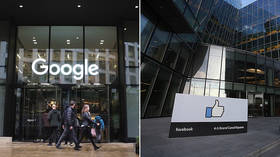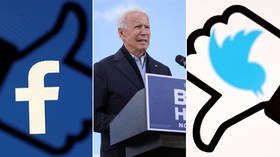Big Tech’s plundered the world like some money-grabbing mafia-style monopoly. At last, action is underway to thwart it

The likes of Facebook and Google have raked in tens of billions by acting as the gatekeepers of information and the Internet, and the antitrust moves being taken against them in the US and elsewhere are long overdue.
Facebook, Google and other tech giants are currently coming under unprecedented scrutiny from governments and corporate regulators in a number of Western democracies. This oversight is long overdue.
Until recently, the tech giants have been permitted to run amok in the West, evading legal restraints and regulations as they made extraordinary profits, morphing within a decade into the largest and most powerful global mega-corporations in the history of capitalism.
In fact, the contemporary tech giants make the 18th-century British East India Company – a formidable money-making enterprise, according to William Dalrymple’s recent definitive book ‘The Anarchy’ – look like a small to middling Starr-Bowkett Society in East Cheam in the 1960s. But recent events suggest the tide may be turning against these leviathans.
In America this week, the US Justice Department, supported by 11 Republican states, commenced a landmark antitrust case against Google for abusing its monopoly market position in respect of online search engines and advertising.
US Deputy Attorney General Jeffrey Rosen alleges that Google stifles competition by paying phone companies to make it the default search engine on mobile-device browsers, thereby forcing users to utilize it. Google apparently pays Apple $16 billion a year for this precise purpose. Rosen stated this week: “Google is a monopoly gatekeeper for the Internet ... and has maintained its monopoly power through exclusionary practices that are harmful to competition.”
If successful, this case could result in the forced breakup of the Google tech empire, which includes YouTube, Android mobile phones, and DoubleClick.
This antitrust litigation should come as no surprise to anyone familiar with the history of the tech giants. The US Justice Department first raised concerns about Google’s monopoly status more than 10 years ago, and Silicon Valley and the Internet have for years been incubators for large-scale monopolistic practices. Apple, Amazon, and Facebook are also currently being investigated by both the US Justice Department and the Federal Trade Commission.
Recently, the US Congress has also taken a keen interest in the nefarious activities of the tech giants, so much so that Facebook executives, including co-founder and CEO Mark Zuckerberg, have felt obliged to give evidence at Senate hearings.
Also on rt.com Our deadly Frankenstein: Social media’s creators admit it dehumanizes people, disrupts social fabric and destroys democracyZuckerberg’s performances have been singularly unimpressive. He comes across as the duplicitous nerd he always was. He robotically maintains that Facebook’s business model is “sound and ethical” and attempts to deflect specific criticisms by endlessly repeating the mantra “I’ll have my team get back to you on that.” When cornered by a knowledgeable cross-examiner, he blandly promises that Facebook will implement vague, unspecified reforms.
US Senators, however, have grown tired of these self-serving platitudes. Republican Senator John Thune pointedly told Zuckerberg at one hearing, “After more than a decade of promises ... why should we trust Facebook to make the necessary changes?” And Democrat Senator Dianne Feinstein bluntly told Facebook executives, “You created these platforms and now they’re being misused. You have to be the ones to do something about it – or we will.”
It’s now clear that the tech giants’ pathetic attempt to explain away improper interference in the 2016 US presidential election by blaming ‘Russian hackers’ is completely and utterly false. There was no ‘hacking’ by anyone. Facebook, Google, and Twitter simply allowed the two main US political parties, and those associated with them, to bombard American voters with large amounts of targeted misinformation, in accordance with their basic business model.
In the same way advertisers use social media to dispense patent falsehoods to users, political operatives use it to covertly target marginal voters during elections. This is all part of the unique service the tech giants eagerly provide to their customers, whether they’re advertisers or political parties. It’s all the same to these behemoths – as long as their customers pay through the nose.
Concerns were raised during recent British elections about Facebook disseminating false and misleading political advertising that bypassed UK electoral laws. The Cambridge Analytica scandal had already made plain the tech giants’ complicity in subverting and corrupting democratic electoral processes.
European corporate regulators are now also belatedly turning their attention to their monopolistic and unlawful practices. The European Union recently fined Google €2.4 billion for breaches of antitrust laws, and a number of member states have passed laws charging the tech giants with absolute responsibility for what they publish, and imposing fines on them when warranted.
In Australia, the federal government and regulators are also focusing on the large tech companies. The Australian Competition and Consumer Commission (ACCC) is currently conducting an inquiry with a view to making them pay traditional media companies for the content they, in effect, steal. The federal government has given a firm commitment to pass legislation by the end of the year to mandate such payments if the tech giants don’t agree to negotiate a settlement.
Facebook has responded, in typical fashion, by threatening to stop publishing news on its platform that was produced by other media companies. Communications Minister Paul Fletcher reacted to this by noting, correctly, that “The tech giants have a history of making heavy-handed threats on public policy issues.”
ACCC Chair Rod Sims said this week that he was “delighted” that the US Department of Justice had filed an antitrust suit against Google. And one Australian think tank, the Australia Institute, recommended the federal government create a “public digital infrastructure” to take over, effectively nationalizing the tech giants. This will not happen, of course, but it is a good indicator of the newfound animosity towards the large tech companies in Western democracies.
Also on rt.com ‘Being a Trump supporter is being a bad person,’ Google manager tells Project Veritas in new revelations of bias in tech giantAustralia has also become a legal battleground in respect of the tech giants’ absurd contention that they’re not “publishers” but mere “platforms,” and are therefore not legally responsible for the content that appears on their sites. This battle has been fought out in the context of the defamation laws, and the Australian courts have firmly rejected that argument – as they should have, given the basic contention is nonsense, both factually and legally.
Unfortunately, some UK courts have caved in on this issue, and, in America, legislation provides social media companies with a degree of undeserved immunity from US defamation laws. President Donald Trump has promised to review this legislation.
The tech giants have recently been forced to admit they have some responsibility for what they publish, and have had to be seen to attempt, at least to some degree, to control what is published on their platforms. But when they do filter content on their platforms, they inevitably do so in the interests of those dominant woke and fashionable political ideologies they’ve always adhered to – thus, their recent censoring of material critical of Joe Biden and his son, Hunter, on social media in the US.
Recent government and regulatory scrutiny has clearly shown that Google’s original motto, “Don't be evil,” is nothing more than a hollow, hypocritical sham. Hopefully, more intense scrutiny in the future will act as a catalyst for radical reform of the way in which the tech giants so corruptly and wantonly operate in Western democracies at present. If that is to happen, however, governments and corporate regulators would do well to keep in mind the following point, forcefully made by Neil Postman in his 1985 book ‘Amusing Ourselves to Death: Public Discourse in the Age of Show Business’:
“Contrary to common belief even amongst the educated, Huxley and Orwell did not prophesy the same thing. Orwell warns that we will be overcome by an externally imposed oppression. But in Huxley’s vision, no Big Brother is required to deprive people of their autonomy, maturity, and history. As he saw it, people will come to love their oppression, to adore the technologies that undo their capacities to think. ... Orwell feared those who would deprive us of information. Huxley feared those who would give us so much that we would be reduced to passivity and egoism.”
Think your friends would be interested? Share this story!
The statements, views and opinions expressed in this column are solely those of the author and do not necessarily represent those of RT.
















